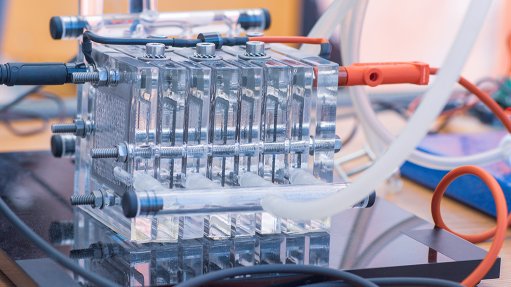
Ballard Power Systems, which develops proton exchange membrane (PEM) fuel cells that use a platinum catalyst as a key component, says mobility solutions have become a focus for the company, especially in the heavy-duty vehicle segment.
In an interview with the World Platinum Investment Council, Ballard marketing director Nicolas Pocard said the company’s mission was to accelerate fuel cell technology adoption.
The company’s products are used in various markets, from heavy-duty automotive power to materials handling, back-up power, unmanned aerial vehicles and marine and rail applications.
“As we see it, fuel cell electric vehicle (FCEV) applications are currently best suited to high duty-cycle, high-usage fleets like buses, trucks, trains and, to some extent, maritime vessels.
“We are seeing real momentum here and our PEM products have now successfully powered around 3 000 FCEVs in commercial applications for more than 30-million kilometres on roads around the world,” notes Pocard.
Today, Ballard is able to provide a fuel cell power module for heavy-duty vehicles that is approaching the operation and performance maturity of the current internal combustion engine.
For example, fuel cell stacks in buses, deployed in central London for eight years, have demonstrated the ability to operate for more than 30 000 hours without degradation – the equivalent of 500 000 km.
“Durability and efficiency are vital to making FCEVs an affordable option for fleet owners. Platinum is the only proven catalyst for fuel cells that delivers on that front – we have not yet found anything else that matches the performance of platinum.
“Never say never, but replacing platinum with an alternative material is not in the offing,” says Pocard.
Considering the cost of such fuel cells, Ballard drives total cost of ownership down by addressing running costs such as servicing and maintenance.
“Ballard’s latest generation fuel cell module, which was launched last year, does just that. In fact, with the 8th-generation FCmove module, Ballard has achieved a 35% reduction in total life cycle cost. Driving down total cost of ownership is vital in the long run for FCEVs to really take off as a powertrain and reach scale,” Pocard points out.
The platinum loading on an 85 kW fuel cell module is around 75 g, or just over 2 oz. Pocard highlights that it is possible for 95% of the platinum on a module to be recycled when the time comes for the stack to be refurbished.
In asking Ballard about how it goes about measuring progress, Pocard states that the company looks at megawatts of power shipped as a key measure. In 2019, more than 100 MW of fuel cell products were shipped.
The company aims to raise this to 1 000 MW of power shipped, hopefully in the next three to five years.
However, Pocard says this will depend on market demand, which is thankfully building for a number of reasons, including the need to address climate change.
“The potential for the hydrogen economy to become a game changer in terms of decarbonisation of economies and reducing emission is firmly on the world’s agenda.”